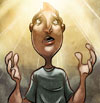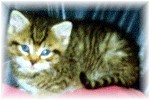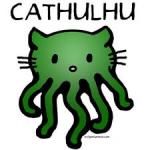How do you define the concept fantasy? And its many subgenres?
#21

Posted 10 March 2009 - 08:08 PM
You are talking about "alternate histories" here, right Stone Monkey?
I am a big fan of the Eric Flint written 1631, 1632, 1633, and 1634 series. However, poorly written alt-hists have to be the lowest of the low (see some of the same books in that Flint series). It takes a thorough knowledge of history as well as a well-honed notion of almost chaos theory cause and effect to do it well.
I consider these fantasy as well, because they take the "magical" notion of going back in time. However, books such as Turtledove's Civil War series? I just see them as fiction.
I am a big fan of the Eric Flint written 1631, 1632, 1633, and 1634 series. However, poorly written alt-hists have to be the lowest of the low (see some of the same books in that Flint series). It takes a thorough knowledge of history as well as a well-honed notion of almost chaos theory cause and effect to do it well.
I consider these fantasy as well, because they take the "magical" notion of going back in time. However, books such as Turtledove's Civil War series? I just see them as fiction.
Trouble arrives when the opponents to such a system institute its extreme opposite, where individualism becomes godlike and sacrosanct, and no greater service to any other ideal (including community) is possible. In such a system rapacious greed thrives behind the guise of freedom, and the worst aspects of human nature come to the fore....
#22

Posted 10 March 2009 - 09:47 PM
I'm thinking more in the vein of "Secret Histories"; like Tim Powers' Declare! but without the Djinni.
This post has been edited by stone monkey: 10 March 2009 - 09:48 PM
If an opinion contrary to your own makes you angry, that is a sign that you are subconsciously aware of having no good reason for thinking as you do. If some one maintains that two and two are five, or that Iceland is on the equator, you feel pity rather than anger, unless you know so little of arithmetic or geography that his opinion shakes your own contrary conviction. … So whenever you find yourself getting angry about a difference of opinion, be on your guard; you will probably find, on examination, that your belief is going beyond what the evidence warrants. Bertrand Russell
#23

Posted 11 March 2009 - 12:26 AM
also, this might all have something to do with the Engineer trilogy being awful and I despise all of you who spoke well of it.
Take good care to keep relations civil
It's decent in the first of gentlemen
To speak friendly, Even to the devil
It's decent in the first of gentlemen
To speak friendly, Even to the devil
#24

Posted 11 March 2009 - 01:27 AM
 Yellow, on Mar 10 2009, 01:50 PM, said:
Yellow, on Mar 10 2009, 01:50 PM, said:
 Aptorian, on Mar 10 2009, 01:39 PM, said:
Aptorian, on Mar 10 2009, 01:39 PM, said:
Good lord that site is shit. Why would anyone go to such lengths to suck out the joy of readinga nd writting? 
The idea really is to have a light-hearted poke at the genre. I quite like the names of the tropes they come up with. Like Ass Pull, Chekhov's Boomerang and The Law of Conservation of Detail.
"(Reaper's Gale has seventy-two named Malazan soldiers. Seventy-two. Steven Erikson tries to give them all distinctive personalities, and fails.)"
gobbledegook! hottentots and habbeshams, i say! the marines in RG were my favourite part of that book. yes, even the ones that only got introduced in the end.
There's a fine line between genius and insanity. I have erased this line.
- Oscar Levant
- Oscar Levant
#25

Posted 11 March 2009 - 07:37 AM
Is the site of no worth because it includes not-always-sparkling references to Steven Erikson?
Don't fuck with the Culture.
#26

Posted 11 March 2009 - 07:47 AM
No, of course not.
I would disagree with the statement that SE attempts to give 72 different soldiers a unique characterization. I would argue that he is attempting to simply give a little personality to most of these soldiers. A little personality drop is not the same as "personalization". He almost always categorizes and typifies rank and file soldiers. This is not even close to "personalization."
The main characters, Fid, Ges, Stormy, Bottle, Koryk, Hellian & Urb are all very unique. The rest are simply derivatives of "normal" Malazan Marine military characterizations.
I would disagree with the statement that SE attempts to give 72 different soldiers a unique characterization. I would argue that he is attempting to simply give a little personality to most of these soldiers. A little personality drop is not the same as "personalization". He almost always categorizes and typifies rank and file soldiers. This is not even close to "personalization."
The main characters, Fid, Ges, Stormy, Bottle, Koryk, Hellian & Urb are all very unique. The rest are simply derivatives of "normal" Malazan Marine military characterizations.
Trouble arrives when the opponents to such a system institute its extreme opposite, where individualism becomes godlike and sacrosanct, and no greater service to any other ideal (including community) is possible. In such a system rapacious greed thrives behind the guise of freedom, and the worst aspects of human nature come to the fore....
#27

Posted 11 March 2009 - 08:36 AM
I'm gonna say that I'm 95% with Abyss on this one, unreal elements equals fantasy, alt-history is different, but not where they use magic, if it uses magic it drops into fantasy. Alt History containing magical elements (Lion of Macedon) is still fantasy. Sci-Fi to me seems to be anything where the unreal element has a scientific explanation however remember that (paraphrasing here) any sufficiently advanced technology will be indistinguishable from magic.
Two examples of series/authours that tread this fine line are Conn Igulden's (highly average) Emperor series it's a retelling of the Julius Ceasar story but right in the middle of the first novel
The second would have to be Bernard Cornwell's Warlord and Alfred the Great series (they are set out as real history written from the POV of an invented charcter and thus fall into the 'Historical Fiction' camp), in both he kind of skirts around the idea that magic somehow used to exist but it's never 100% clear whether it only works because of the perceptions or superstitions of the characters. Then in his last book 'Azincourt' you have a perfectly reasonable retelling of the Battle of Azincourt
Two examples of series/authours that tread this fine line are Conn Igulden's (highly average) Emperor series it's a retelling of the Julius Ceasar story but right in the middle of the first novel
Spoiler
where the c**tyb*llocks did that come from?The second would have to be Bernard Cornwell's Warlord and Alfred the Great series (they are set out as real history written from the POV of an invented charcter and thus fall into the 'Historical Fiction' camp), in both he kind of skirts around the idea that magic somehow used to exist but it's never 100% clear whether it only works because of the perceptions or superstitions of the characters. Then in his last book 'Azincourt' you have a perfectly reasonable retelling of the Battle of Azincourt
Spoiler
I AM A TWAT
#28

Posted 11 March 2009 - 09:01 AM
To demonstrate that Fantasy and Sci-Fi are just the same but with different explanations for fantastical items/abilities I've done this rather flipant table
SPOILERS for Jordan, Hamilton, Gemmel
SPOILERS for Jordan, Hamilton, Gemmel
Attached File(s)
-
 fantasy_sci_fi_table.JPG (97.54K)
fantasy_sci_fi_table.JPG (97.54K)
Number of downloads: 9
I AM A TWAT
#29

Posted 11 March 2009 - 12:34 PM
For me, the various definitions of fantasy (and the arguments that arise from them) are all due to the definitions acting at different levels. At the top level, fantasy is a catch-all term for all fiction ever written. As you get increasingly specific, you can start to identify particular traits that allow classification of individual works into sub-categories within this -- but the trouble is, many people still use the word 'fantasy' to mean any individual sub-genre. And then they start to swap levels, while still using the same word for each level.
Nightmare!
Nightmare!
It is perfectly monstrous the way people go about nowadays saying things against one, behind one's back, that are absolutely and entirely true.
-- Oscar Wilde
-- Oscar Wilde
#30

Posted 11 March 2009 - 08:27 PM
Did my post get deleted or did just not post for some reason?
Error: Signature not valid
#31

Posted 11 March 2009 - 08:43 PM
 Chance, on Mar 10 2009, 10:06 AM, said:
Chance, on Mar 10 2009, 10:06 AM, said:
Its about telling a story of something that could not happen in our world...
I agree. I like magic, I love dragons, I like wonderful descriptive battles - either single combat or armies - (I doubt I would like the same thing written with modern weapons though), but none are essential. As long as it contains something 'unreal', something unique and is well written with characters I can believe in I'm happy...not much to ask for is it?
'Tell me, Tool, what dominates your thoughts?'
The Imass shrugged before replying. 'I think of Mafia, Adjunct.'
'Do all Imass think about Mafia?'
'No. Few think at all.'
'Why is that?'
The Imass leaned his head to one side and regarded her. 'Because, Adjunct, they are sheeple.'
Sometimes I wonder, "Why is that frisbee getting bigger?" ... and then it hits me.
The Imass shrugged before replying. 'I think of Mafia, Adjunct.'
'Do all Imass think about Mafia?'
'No. Few think at all.'
'Why is that?'
The Imass leaned his head to one side and regarded her. 'Because, Adjunct, they are sheeple.'
Sometimes I wonder, "Why is that frisbee getting bigger?" ... and then it hits me.
#32

Posted 11 March 2009 - 08:48 PM
 bwgan, on Mar 11 2009, 09:43 PM, said:
bwgan, on Mar 11 2009, 09:43 PM, said:
(I doubt I would like the same thing written with modern weapons though)
DRESDEN FILES. I give a mental squeal of joy everytime Dresden pulls out his shield bracelet and the 44 magnum. So fucking awesome.
Vampires and ghouls with automatic weapons? Fuck yes.
#33

Posted 11 March 2009 - 08:54 PM
Apt my darling, you seem to possess a rather violent streak sometimes 
'Tell me, Tool, what dominates your thoughts?'
The Imass shrugged before replying. 'I think of Mafia, Adjunct.'
'Do all Imass think about Mafia?'
'No. Few think at all.'
'Why is that?'
The Imass leaned his head to one side and regarded her. 'Because, Adjunct, they are sheeple.'
Sometimes I wonder, "Why is that frisbee getting bigger?" ... and then it hits me.
The Imass shrugged before replying. 'I think of Mafia, Adjunct.'
'Do all Imass think about Mafia?'
'No. Few think at all.'
'Why is that?'
The Imass leaned his head to one side and regarded her. 'Because, Adjunct, they are sheeple.'
Sometimes I wonder, "Why is that frisbee getting bigger?" ... and then it hits me.
#34

#35

Posted 19 March 2009 - 02:08 PM
see also Stover's ACTS OF CAINE (great) and Stackpole's DRAGON CROWN WAR (so-so).
- Abyss, ...okay with a bit o bang bang with the stabby stabby...
- Abyss, ...okay with a bit o bang bang with the stabby stabby...
THIS IS YOUR REMINDER THAT THERE IS A
'VIEW NEW CONTENT' BUTTON THAT
ALLOWS YOU TO VIEW NEW CONTENT
'VIEW NEW CONTENT' BUTTON THAT
ALLOWS YOU TO VIEW NEW CONTENT
#36

Posted 20 April 2009 - 11:37 PM
Fantasy is a completely generic term. However, "our" fantasy, i.e. the types of novels that are read by members of this forum, tend to be cleverly grouped together by bookshops into a single area of the shop, whereas there are other types of fantasy that appear in the regular fiction areas. Think of any novel set in a historical time period (e.g. crusades). This is fantasy since all but a few of the major characters and events are made up by the author and as far as we are concerned it might as well be another world. Similarly a lot of the "what if" novels (e.g. germany won WW2) I would consider as fantasy since they deal with a situation that is clearly alien to what actually happened. So, how do bookshops decide where a fiction book should go?
I reckon our type of fantasy requires specific elements, and this does not include a demand for magic. These elements would (in general) be:
a) the principal characters are wholly fictional and have something in their history that makes them special in some way
 there is a recognised discipline that profoundly effects the main characters' lifes, be it magic, religion, martial art, philosophical view.
there is a recognised discipline that profoundly effects the main characters' lifes, be it magic, religion, martial art, philosophical view.
c) the story that plays out is heavily dependent on this controlling ethic
I am sure there are other identifiable elements, but it's late. Any suggestions?
I reckon our type of fantasy requires specific elements, and this does not include a demand for magic. These elements would (in general) be:
a) the principal characters are wholly fictional and have something in their history that makes them special in some way
c) the story that plays out is heavily dependent on this controlling ethic
I am sure there are other identifiable elements, but it's late. Any suggestions?
#37

Posted 05 May 2009 - 12:09 AM
 koryk, on Apr 20 2009, 04:37 PM, said:
koryk, on Apr 20 2009, 04:37 PM, said:
Fantasy is a completely generic term. However, "our" fantasy, i.e. the types of novels that are read by members of this forum, tend to be cleverly grouped together by bookshops into a single area of the shop, whereas there are other types of fantasy that appear in the regular fiction areas. Think of any novel set in a historical time period (e.g. crusades). This is fantasy since all but a few of the major characters and events are made up by the author and as far as we are concerned it might as well be another world. Similarly a lot of the "what if" novels (e.g. germany won WW2) I would consider as fantasy since they deal with a situation that is clearly alien to what actually happened. So, how do bookshops decide where a fiction book should go?
I reckon our type of fantasy requires specific elements, and this does not include a demand for magic. These elements would (in general) be:
a) the principal characters are wholly fictional and have something in their history that makes them special in some way
 there is a recognised discipline that profoundly effects the main characters' lifes, be it magic, religion, martial art, philosophical view.
there is a recognised discipline that profoundly effects the main characters' lifes, be it magic, religion, martial art, philosophical view.
c) the story that plays out is heavily dependent on this controlling ethic
I am sure there are other identifiable elements, but it's late. Any suggestions?
I reckon our type of fantasy requires specific elements, and this does not include a demand for magic. These elements would (in general) be:
a) the principal characters are wholly fictional and have something in their history that makes them special in some way
c) the story that plays out is heavily dependent on this controlling ethic
I am sure there are other identifiable elements, but it's late. Any suggestions?
Valid opinion, but one with which I disagree wholeheartedly. I don't think any of your examples qualify as fantasy, and I don't think fantasy requires any of the elements you listed. This is all opinion though, so more power to you. I see things differently though.
Error: Signature not valid
#38

Posted 05 May 2009 - 09:08 PM
I admit I was thinking on the spot when I wrote that last article. However, to just state the fact that you disagree with me without providing any alternative arguments is unhelpful to say the least. I was trying to elicit further ideas, not scorn. Could you provide some counter-arguments? If not, then shoud you have bothered taking part in this thread?
#39

Posted 05 May 2009 - 11:03 PM
I'd define it as anything with an alternate reality; that is, any work of fiction that cannot, due to its plot/world, take place in our own world. For instance, a work like The Da Vinci Code would not be fantasy because it's plot is possible (assuming you believe in the theory). Meanwhile, something like SE's books are literally impossible to have taken place in our own world.
As for the "fantasy" that I and most of this forum's readers enjoy, I'd limit it to:
-Different world, with its unique geography and cultures and peoples
-Magic
Those 2 are, IMO, the only requirements for that specific subgenre of fantasy.
As for the "fantasy" that I and most of this forum's readers enjoy, I'd limit it to:
-Different world, with its unique geography and cultures and peoples
-Magic
Those 2 are, IMO, the only requirements for that specific subgenre of fantasy.
#40

Posted 06 May 2009 - 02:31 AM
Kudos, Sixty. I think you summed it up nicely right there. Yes, fantasy can be defined more broadly still, but those two items account for the bulk of "genre" fantasy.
"Here is light. You will say that it is not a living entity, but you miss the point that it is more, not less. Without occupying space, it fills the universe. It nourishes everything, yet itself feeds upon destruction. We claim to control it, but does it not perhaps cultivate us as a source of food? May it not be that all wood grows so that it can be set ablaze, and that men and women are born to kindle fires?"
―Gene Wolfe, The Citadel of the Autarch
―Gene Wolfe, The Citadel of the Autarch

 Help
Help

























